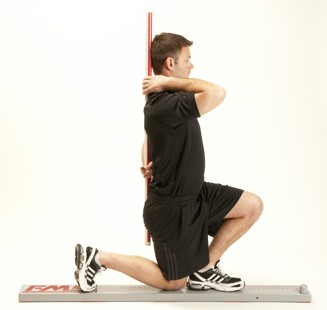What is it?
Quite simply, The FMS is a set of seven simple tests designed to evaluate a person’s or team’s fundamental movement abilities. It is used to identify movement limitations and left/right muscle asymmetries.
This is an internationally used and scientifically proven (Chobra, 2010) screen in identifying muscular imbalances that have the potential to result in injuries for the athlete and is used by professional sports teams.
The FMS creates a functional baseline to mark progress and provides a means to measure performance.
The tests are:
- Deep Squat (Lower Body): Used to assess symmetrical and functional mobility of the hips, knees, and ankles.
- Hurdle Step (Lower Body): Gauges stability and functional mobility of the hips, knees, and ankles.
- In-
Line Lunge (Lower Body): Used to assess torso, shoulder, hip and ankle stability and mobility, quadriceps flexibility, and knee stability. - Shoulder Mobility (Upper Body): Assesses shoulder range of motion as well as shoulder blade mobility.
- Straight Leg Raiser (Lower Body): Gauges functional hamstring and calf flexibility while maintaining a stable pelvis.
- Trunk Stability Push-
Up (Upper/Lower Body): Used to assess symmetrical core stability. - Rotary Stability (Upper/Lower Body): Assesses core stability in combination with upper and lower body mobility.
Why undergo a Functional Movement screening?
- To ascertain what movements a client or athlete is proficient in or struggling with. Skipping the assessment means the coach has no roadmap from which to work, to the detriment of the client.
- To identify potential injury risk, so it can be mitigated through corrective exercise.
- To determine whether a training programme is, in fact, improving the client’s movement quality, by retesting at a later date.
- To maximise the performance potential by improving movement quality, remember, more load isn’t better, more speed isn’t better, BETTER IS BETTER.


